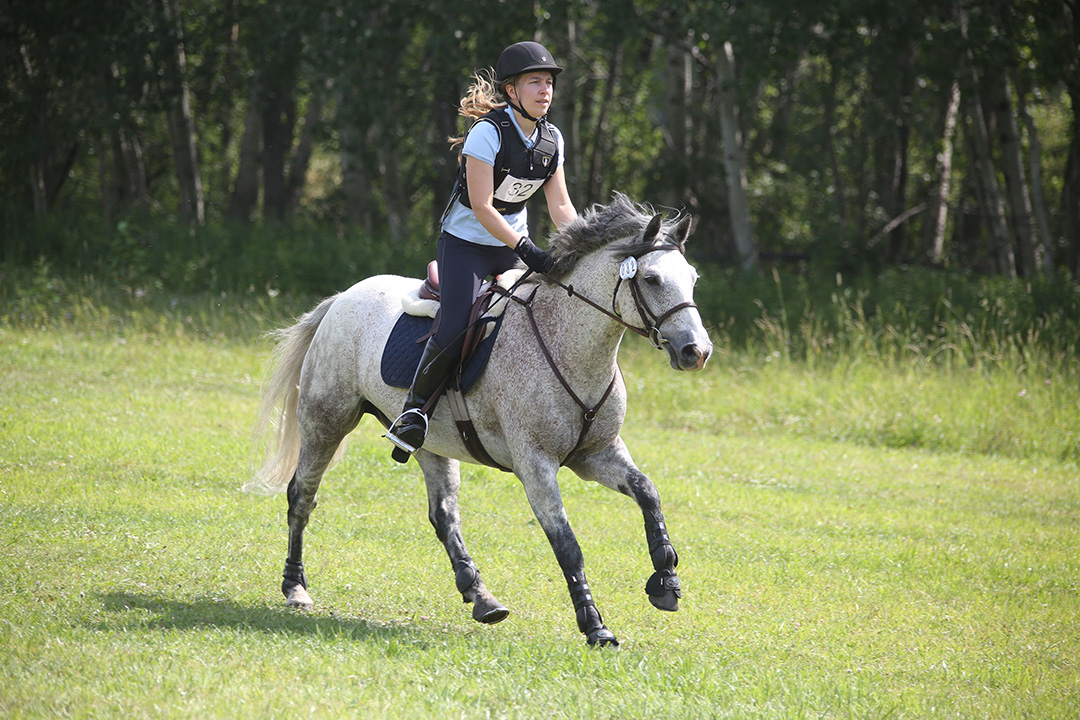
Pumping up equine health: new research aims to improve heart disease diagnostics
Imagine being able to diagnose equine myocardial disease — diseases that affect horses’ heart muscles — quickly, accurately and right at the barn.
By Rigel Smith
That's the goal of new research at the Western College of Veterinary Medicine (WCVM), where researchers will explore the value of implementing a blood test that can produce results in just 10 minutes.
Dr. Vanessa Cowan (DVM, PhD), an assistant professor in the WCVM Department of Veterinary Biomedical Sciences, is leading the new research study that will begin in May 2025 with $15,657 in financial support from the Mark and Pat DuMont Equine Performance Fund. The DuMonts’ generous support of WCVM-based equine health research complements the college’s longstanding Townsend Equine Health Research Fund (TEHRF).
Cowan says the inspiration behind the project stems from the need to improve diagnostic tools for equine myocardial disease. Veterinarians currently rely on relatively non-specific diagnostic methods such as electrocardiograms (ECGs), echocardiography, and basic blood tests to detect this disease in their patients.
“Nothing is really specific for myocardial disease,” explains Cowan. “That’s where this test would come in — it would [quantify] cardiac troponins, which are considered the gold standard for diagnosing myocardial disease in humans and animals.”
As Cowan describes, cardiac troponins are proteins that are released into the blood when heart muscle is damaged.
“When the cardiac muscle is damaged— perhaps due to disease — all these damaged cardiac muscle cells will leak out the cardiac troponins, and so you will see a spike of those cardiac troponins in the blood,” says Cowan.
These proteins could offer a precise diagnostic marker for equine myocardial issues — similar to what physicians use to diagnose heart attacks in human patients.
While troponin tests are currently available for veterinarians, getting results isn’t a quick process since they require time-consuming lab analyses. Veterinarians also can’t take the tests on field service calls, which limits the diagnostic abilities of veterinary teams outside of a clinic or hospital.
This test would also help diagnose an increasingly common poisoning in horses: ionophore toxicity, which specifically affects the animals’ heart muscles.
Ionophores are a class of antibiotic-like compounds that are added to the feed of animals such as cattle, chickens and goats. One of the commercially available ionophores available to livestock feed processors is monensin (sold as Coban or Rumensin in Canada) The compound is effective in promoting growth, improving feed efficiency and preventing the parasitic disease coccidiosis.
But for horses, ionophores can be deadly. In the past five years, WCVM researchers have received an increasing number of calls related to potential ionophore poisonings in horses.
“Horses are the most sensitive species to ionophore toxicity,” says Cowan. “When horses are exposed to essentially any amount of these ionophores in feed, they can have heart damage and often go on to die.”
Researchers still aren’t sure why horses are so sensitive to the additive, but due to the compound's popularity as a feed additive, accidental consumption can easily happen. Poisoning cases are often caused by cross-contamination in the feed mill or when horses accidentally ingest feed meant for other livestock.
Cowan explains that the current tests available to veterinarians can’t help them differentiate between general muscle damage and cardiac-specific muscle damage. This lack of specific knowledge makes it challenging to diagnose ionophore poisoning in equine patients.
“Say a horse has been recumbent for a while and it can't get up — just the horse being on its side for a long time, compressing those muscles, is enough to cause a spike in indicators of muscle damage in the blood,” she says. “We need to be able to look at cardiac muscle specifically for better sensitivity in our diagnostics.”
The project also aims to establish a baseline level for cardiac troponins in horses. Cowan explains that all horses have some level of cardiac troponins in the blood due to normal cell turnover. By enrolling healthy horses from the WCVM teaching herd as well as both healthy and hospitalized client-owned horses in the study, Cowan hopes to create a baseline that veterinarians can use to gauge the results of potentially sick horses.
She also plans to investigate how extreme temperatures affect cardiac troponin levels in horses. This aspect of the research is novel and could provide valuable insights into how environmental stressors have an impact on equine heart health.
“In Saskatchewan we all know that we can go from very extreme temperatures, and our equine patients are typically outside for all that,” says Cowan.
She explains that horses exist within a thermoneutral zone — the range of temperatures in which they can maintain their body temperature with little additional energy. That temperature zone for horses is between five and 25 degrees Celsius. Anything outside of that span — whether the temperature is hotter or colder — can put extra stress on a horse’s heart as it works to maintain its internal temperature.
Cowan envisions a future where these stall-side tests are standard, providing reliable and rapid diagnostics that can significantly improve the management of equine myocardial disease — both in a clinical setting and in the field.
“At the WCVM, we pride ourselves on being able to offer the highest level of care to our equine patients,” says Cowan. “As the sole referral centre for equine patients in this province, having an additional diagnostic test will only improve our ability to care for our patients.”
Dr. Vanessa Cowan is seeking a master’s student to join her in this focus area of research. If you have equine handling experience and are interested in graduate studies, send a message to vanessa.cowan@usask.ca.
Together, we will undertake the research the world needs. We invite you to join by supporting critical research at USask.
